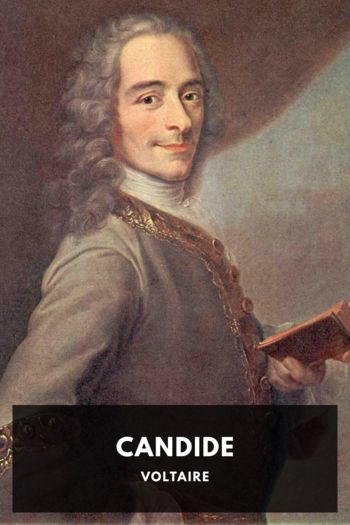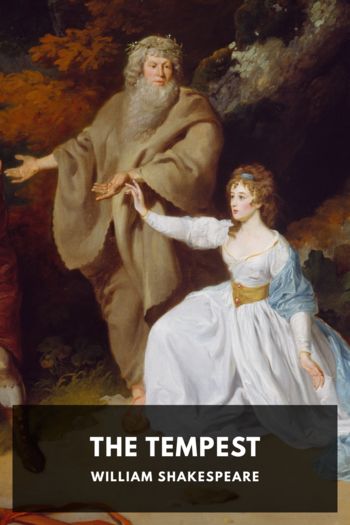Candide - Voltaire (world of reading txt) 📗

- Author: Voltaire
Book online «Candide - Voltaire (world of reading txt) 📗». Author Voltaire
“They are by Raphael,” said the Senator. “I bought them at a great price, out of vanity, some years ago. They are said to be the finest things in Italy, but they do not please me at all. The colours are too dark, the figures are not sufficiently rounded, nor in good relief; the draperies in no way resemble stuffs. In a word, whatever may be said, I do not find there a true imitation of nature. I only care for a picture when I think I see nature itself; and there are none of this sort. I have a great many pictures, but I prize them very little.”
While they were waiting for dinner Pococurante ordered a concert. Candide found the music delicious.
“This noise,” said the Senator, “may amuse one for half an hour; but if it were to last longer it would grow tiresome to everybody, though they durst not own it. Music, today, is only the art of executing difficult things, and that which is only difficult cannot please long. Perhaps I should be fonder of the opera if they had not found the secret of making of it a monster which shocks me. Let who will go to see bad tragedies set to music, where the scenes are contrived for no other end than to introduce two or three songs ridiculously out of place, to show off an actress’s voice. Let who will, or who can, die away with pleasure at the sight of an eunuch quavering the role of Caesar, or of Cato, and strutting awkwardly upon the stage. For my part I have long since renounced those paltry entertainments which constitute the glory of modern Italy, and are purchased so dearly by sovereigns.”
Candide disputed the point a little, but with discretion. Martin was entirely of the Senator’s opinion.
They sat down to table, and after an excellent dinner they went into the library. Candide, seeing a Homer magnificently bound, commended the virtuoso on his good taste.
“There,” said he, “is a book that was once the delight of the great Pangloss, the best philosopher in Germany.”
“It is not mine,” answered Pococurante coolly. “They used at one time to make me believe that I took a pleasure in reading him. But that continual repetition of battles, so extremely like one another; those gods that are always active without doing anything decisive; that Helen who is the cause of the war, and who yet scarcely appears in the piece; that Troy, so long besieged without being taken; all these together caused me great weariness. I have sometimes asked learned men whether they were not as weary as I of that work. Those who were sincere have owned to me that the poem made them fall asleep; yet it was necessary to have it in their library as a monument of antiquity, or like those rusty medals which are no longer of use in commerce.”
“But your Excellency does not think thus of Virgil?” said Candide.
“I grant,” said the Senator, “that the second, fourth, and sixth books of his Aeneid are excellent, but as for his pious Aeneas, his strong Cloanthus, his friend Achates, his little Ascanius, his silly King Latinus, his bourgeois Amata, his insipid Lavinia, I think there can be nothing more flat and disagreeable. I prefer Tasso a good deal, or even the soporific tales of Ariosto.”
“May I presume to ask you, sir,” said Candide, “whether you do not receive a great deal of pleasure from reading Horace?”
“There are maxims in this writer,” answered Pococurante, “from which a man of the world may reap great benefit, and being written in energetic verse they are more easily impressed upon the memory. But I care little for his journey to Brundusium, and his account of a bad dinner, or of his low quarrel between one Rupilius whose words he says were full of poisonous filth, and another whose language was imbued with vinegar. I have read with much distaste his indelicate verses against old women and witches; nor do I see any merit in telling his friend Mæcenas that if he will but rank him in the choir of lyric poets, his lofty head shall touch the stars. Fools admire everything in an author of reputation. For my part, I read only to please myself. I like only that which serves my purpose.”
Candide, having been educated never to judge for himself, was much surprised at what he heard. Martin found there was a good deal of reason in Pococurante’s remarks.
“Oh! here is Cicero,” said Candide. “Here is the great man whom I fancy you are never tired of reading.”
“I never read him,” replied the Venetian. “What is it to me whether he pleads for Rabirius or Cluentius? I try causes enough myself; his philosophical works seem to me better, but when I found that he doubted of everything, I concluded that I knew as much as he, and that I had no need of a guide to learn ignorance.”
“Ha! here are fourscore volumes of the Academy of Sciences,” cried Martin. “Perhaps there is something valuable in this collection.”
“There might be,” said Pococurante, “if only one of those rakers of rubbish had shown how to make pins; but in all these volumes there is nothing but chimerical systems, and not a single useful thing.”
“And what dramatic works I see here,” said Candide, “in Italian, Spanish, and French.”
“Yes,” replied the Senator, “there are three thousand, and not three dozen of them good for anything. As to those collections of sermons, which altogether are not worth a single page of Seneca, and those huge volumes of theology, you may well imagine that neither I nor anyone else ever opens them.”
Martin saw some shelves filled with English books.
“I have a notion,” said he, “that a Republican must be greatly pleased with most of these books, which are written with a spirit of freedom.”
“Yes,” answered Pococurante, “it is





Comments (0)